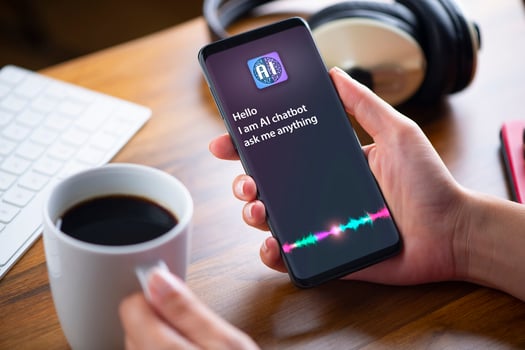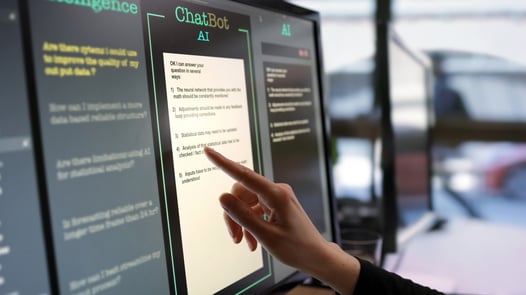Key Takeaways:
- Artificial intelligence is becoming a crucial factor in talent acquisition and recruitment due to its ability to automate and optimize certain functions.
- AI recruitment tools offer streamlined solutions for tackling time-consuming tasks and can complement human expertise to enhance competitiveness and decision-making.
- To maximize the effectiveness of AI in recruitment, companies need comprehensive and accurate data, clear understanding of goals, and a well-balanced strategy that incorporates AI where it's most beneficial.
Twenty-four percent of businesses have started using AI to acquire talent and 56% of managers plan to adopt AI technology in the next year. This showcases that talent acquisition leaders must seriously consider integrating AI-powered software into their recruitment strategies. The ability to work faster, smarter, and more efficiently has become essential for working in this competitive landscape.
Artificial intelligence (AI) has emerged as a massively disruptive and sometimes polarizing force in various industries, and recruitment is no exception. By training machines to perform tasks, AI has the potential to both automate and optimize certain functions. The role of AI in recruitment is a catalyst for change. By freeing up time and automating repetitive tasks, AI empowers recruitment professionals to achieve their end goals at an accelerated pace. The boost in efficiency AI can enhance hiring pipelines, ensuring a smoother and more effective recruitment process overall.
Using AI in Recruitment
The power of AI is gradually being realized by the modern workforce. However, discussions surrounding the effective use of AI-driven technology in recruitment can vary greatly. While some hiring professionals have already embraced AI, others approach it with caution, and some outright reject its implementation. Surprisingly, while 58% of people are familiar with ChatGPT, only 14% have tried it.
AI technology is not designed to replace human efforts; rather, it is intended to enhance their capabilities and streamline time-consuming manual processes. By automating tasks, AI enables recruitment teams to dedicate more time and effort to other strategic initiatives. Recruiters say saving time is the primary rationale behind AI recruitment implementation, with 44% acknowledging this as the leading factor. When integrated seamlessly, AI becomes a useful tool in the recruitment toolbox.
Ignoring the presence of AI is not an option, and its benefits are here to stay. It is imperative to grasp the essence of AI, comprehend its capabilities, and fully appreciate the advantages it brings to the recruitment process.

Things to Consider with Artificial Intelligence
Embracing the potential of AI in the workplace is an indispensable approach to staying competitive and fostering growth. Despite the existential risks that may be associated with its adoption, it's crucial not to ignore the undeniable truth: the AI train is unstoppable and has already arrived at the station. Companies that remain oblivious to this fact are bound to lag behind their forward-thinking counterparts. The undeniable reality is that AI will usher in significant transformations in hiring processes, work dynamics, and overall strategic thinking.
Granted, apprehensions about job losses due to AI implementation are valid, but avoiding the integration of AI into company strategies solely based on these concerns is shortsighted. The reality is that many businesses have already harnessed the power of AI or are in the process of doing so. Also, 62% think the “use of AI in the workplace will have a major impact on workers generally over the next 20 years.” By hesitating, companies risk falling behind and losing out on the competitive edge that AI-driven strategies can provide.
Artificial Intelligence Tools: Partnering with Human Experience
As mentioned above, incorporating AI into a company's operations doesn't mean disregarding the human element. Instead, it can complement human abilities and accelerate the achievement of goals. AI can excel in handling repetitive, high-volume tasks like screening, sourcing, and scheduling – thereby freeing up valuable human resources to focus on higher-value responsibilities.
It’s essential to recognize that AI is not infallible. While it can process vast amounts of information rapidly, it lacks the depth of understanding and contextual nuances that only humans can provide. Human intervention is crucial to validate, interpret, and improve the outcomes generated by AI algorithms. Additionally, AI may sometimes make errors or produce biased results, emphasizing the need for human oversight for ethical considerations.
The key to effectively utilizing AI tools lies in considering them as extensions of ourselves, not replacements. While these tools can be powerful, human intervention remains crucial most of the time. Contrary to a common misconception, AI-powered tools require training just like human team members do. Machines cannot think or improvise without proper training. Their true strength lies in identifying patterns rather than independent thinking. Therefore, striking a balance between human involvement and leveraging AI outputs is essential. Managing the candidate experience, for instance, still requires human intervention to ensure it remains positive and enriching. Solely relying on AI and its outputs without human oversight can lead to errors and misunderstandings – especially when many overlook data protection when rushing to implement.
Remember, recruitment AI tools are not magical solutions. They’re critical tools for running a successful business – when used appropriately.
By combining the strengths of AI's computational power with human insights, creativity, and critical thinking, companies can harness their full potential – while ensuring that the final output is accurate, reliable, and aligned with the company’s expectations.

The Growth of AI Recruitment Tools
The future of AI tools is characterized by numerous iterations as they relentlessly strive to optimize and evolve, ensuring their continuous growth and benefits for professionals. With each iteration, AI tools will undergo improvements, fine-tuning, and advancements that make them more efficient and reliable. This iterative process is essential to keep pace with ever-changing industry demands and challenges.
Aptitude Research found that 42% of recruiters believe that AI will make it possible for them to work more strategically. By constantly refining and enhancing AI technologies, hiring professionals can expect to witness even greater assistance, streamlined workflows, and expanded capabilities.
The Benefits of Artificial Intelligence Recruiting Tools
Recruiters are constantly facing the challenge of accomplishing more within limited resources. This is where the power of AI recruitment tools comes into play, offering a streamlined solution to tackle the tasks that consume significant amounts of time.
When robust technology is paired with human expertise in the industry, companies can harness the best of both worlds. This combination not only ensures efficiency but also enhances competitiveness. AI serves as a guiding force, enabling decision-making and leading to better outcomes for recruitment professionals. This can not only accelerate productivity, but also enhance overall job satisfaction.
AI chatbots, for instance, can revolutionize the hiring process by handling candidate inquiries, scheduling interviews, and managing documentation requests. According to the Forbes Advisor survey, 73% of businesses use or plan to use AI-powered chatbots for instant messaging. By automating these tasks, hiring professionals are freed up to concentrate on higher-level responsibilities, resulting in reduced hiring costs and increased efficiency. Additionally, recruiting AI can efficiently identify the top candidates from a vast pool, leveraging key attributes to make the selection process more targeted and precise.
The evolving role of AI in recruitment paves the way for a future where professionals can focus on strategic decision-making and drive exceptional outcomes.

Maximize the Effectiveness of Recruiting AI
To fully leverage the potential of AI in recruitment, a vital step is examining the aspects aimed to be augmented. Remember, the quality of data and information directly influences the output of the AI system. Ensuring comprehensive and accurate data maximizes the effectiveness of AI-driven HR technology. The better the data or information, the higher the quality of AI output.
Understand Goals When Implementing AI for Recruiting
The rapid escalation of costs with AI usage, particularly when using it at high frequencies, is a critical consideration. There is a risk of runaway costs when automating processes and generating an overwhelming output. The sheer volume of AI-driven content can become extremely costly quickly. To mitigate these risks, it becomes crucial to clearly understand the company’s goals and carefully assess the potential expenses associated with AI implementation.
Partnering Automation Tools With Recruitment Strategies
A successful company-level approach to recruitment and hiring with AI starts with a clear understanding of objectives. Even though 86.1% of recruiters using AI say it speeds up the hiring process, it's essential to know what the company aims to achieve by implementing AI in processes. Instead of adopting a broad, grand-scale perspective, it's crucial to delve deeper and break down specific initiatives into actionable steps. By doing so, hiring professionals can determine how AI can specifically assist in accomplishing those objectives. Rushing to implement AI everywhere without a well-defined strategy can lead to errors. Companies should also avoid incorporating technology just for the sake of it.
On the other hand, dismissing AI can reduce cost-effectiveness and leave the company unprepared for future market shifts. Striking the right balance between AI and human intervention and where it belongs in the hiring process is crucial and depends on an organization's specific requirements. A well-balanced strategy with AI recruitment tools can optimize efficiency and success.
Moving Forward
The future of work demands a greater reliance on technology to remain competitive and prepare for what lies ahead. In recruiting, AI is best understood as a human-centered approach that leverages its capabilities to boost job performance. Embracing technology and data can significantly enhance the hiring experience for professionals, making it a worthwhile pursuit. With 83% of U.S. employers relying on some form of AI technology, it’s essential for companies to be open-minded about implementing AI recruitment tools.
Although the prospect of new technological developments can be intimidating, AI is not as daunting as it may seem. By utilizing available tools and automating processes at scale, businesses can increase workplace efficiency and productivity. Embracing AI empowers companies to optimize their operations, improve decision-making, and stay ahead in a rapidly evolving landscape.
—
If you’re looking for ways to implement AI into your recruitment strategy, reach out to Recruitics! We’re revolutionizing the way to find, attract, and convert top talent. Our skilled team leverages real-time data to pivot, innovate, and collaborate to help you become more precise, intuitive, and efficient in your recruitment processes.



